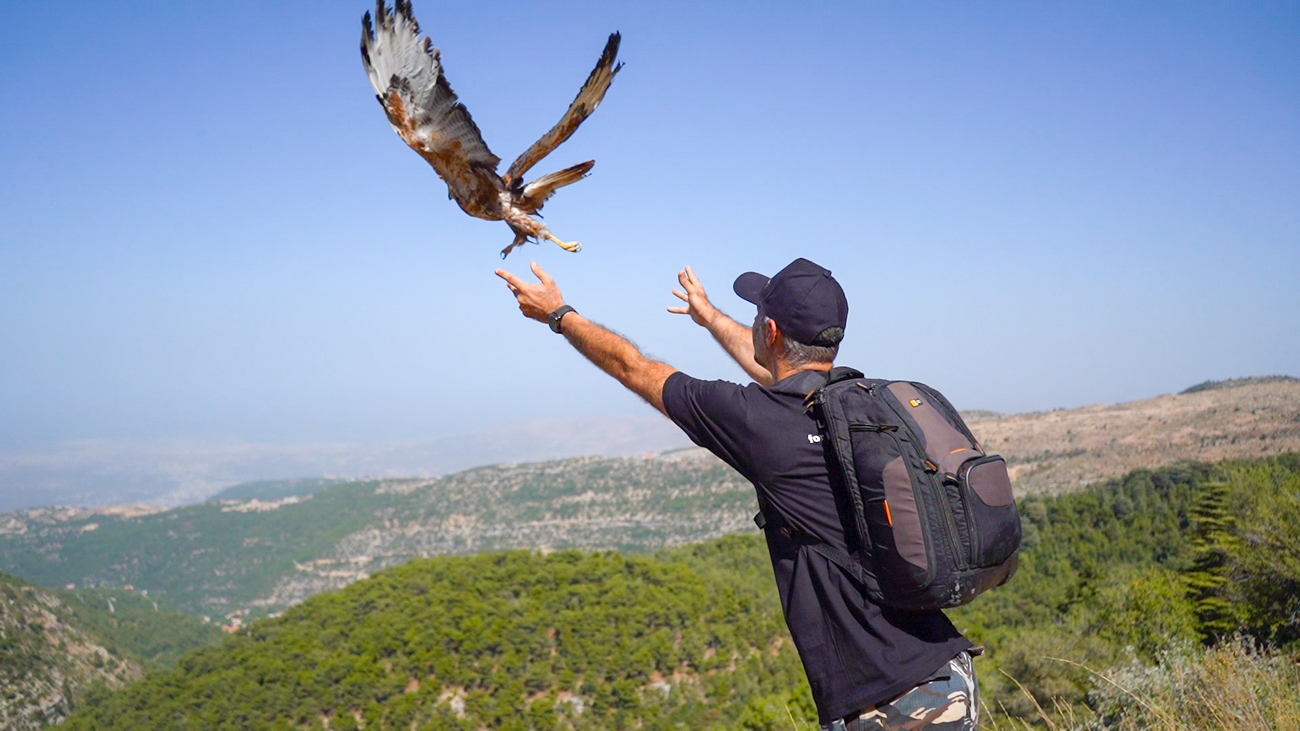Blog
Long’uro: one elephant’s story of immense resilience
Read moredangerous migrations: protecting wild birds from poachers in Lebanon

Written by Nabegh Ghazal Asswad, programme manager – MENA
Every year, an estimated 2.6 million birds are illegally killed as they migrate over Lebanon. That makes Lebanon the fourth most dangerous country in the Mediterranean in terms of the number of birds killed, according to BirdLife International’s report on the illegal killing of birds in the Mediterranean.
I have worked in bird conservation for decades, first in my old town of Aleppo, Syria, and now focusing on the whole of the Middle East. Knowing how poaching leads to declining bird populations, I find it especially troubling that a large proportion of the poached birds are inedible and killed mainly for so-called sport.
Worse, in addition to being shot, they are often killed by cruel methods such as limesticks (branches or twigs covered in a sticky glue called birdlime), mist nets which cause entanglement injuries, and bird calling machines that lure them to their death. Many of the birds are not killed straightaway but are left seriously injured and dumped in fields to die.
It’s truly a horrific scene.
Millions of birds from more than 400 species inhabit the country permanently or during their migration between their breeding grounds in Central and Eastern Europe and their wintering grounds in Central and Eastern Africa. One of the most important migratory routes along the East Mediterranean Flyway is the Koura-Zgharta-Dannieh-Minieh-Akkar line in North Lebanon.
Raptors, storks, cranes, and other soaring birds use thermals to gain elevation and fly with minimal wing beats during migration. Because of fatigue and unsuitable weather along this line, they sometimes fly at very low altitudes over North Lebanon. That makes them especially vulnerable to poachers.
These birds cannot be left to suffer and die, especially when their survival is vital for European and African ecosystems and will ultimately sustain the survival of other species.
That is why IFAW joined the Lebanese Association for Migratory Birds (LAMB) to form the Levant Operation for Bird Rescue project. Together, we rescue and rehabilitate injured birds—especially raptors and soaring birds—and release them back into the wild after their recovery.
So far, we have restored the enclosures at LAMB's rescue centre to keep injured birds safe, and we created new isolation enclosures where birds can recover and be rehabilitated after they receive medical care. We also provided medical kits and equipment for the rescue operation, as well as suitable bird food and supplements—quite a big challenge given the difficult economic circumstances in Lebanon.
We don’t intend to just fix the problem—we want to prevent it from happening in the first place. That's why we're monitoring and reporting violations to help the authorities prevent wildlife crime and prosecute poachers. We will also deliver tailored trainings (DISRUPT) for law enforcement and create awareness campaigns for the public about the dangers and consequences of wildlife crime and the need to conserve birds.
When I visited our project site, LAMB’s president, Dr. Michel Sawan, told me: “Chasing and reporting poachers is a courageous but dangerous act, even more dangerous when the country is undergoing an economic crisis that would soon deplete its resources. Add to that global inflation, and you will have a recipe for disaster.”
It’s an unfortunate reality that we must overcome.
I’m very happy to share that since the project began in May 2022, we have rescued, treated and successfully released 21 birds. Eleven others are now rehabilitating in the centre, and we are still rescuing and treating more birds. Sadly, many birds have fatal injuries, and we are unable to save them, but that is why our work to prevent these crimes happening is so important.
These rescues allow birds to continue their migration safely into Africa, where they play a crucial role in providing balanced ecosystems for other wild animals to roam and thrive.
Every problem has a solution, every solution needs support.
The problems we face are urgent, complicated, and resistant to change. Real solutions demand creativity, hard work and involvement from people like you.
Unfortunately, the browser you use is outdated and does not allow you to display the site correctly. Please install any of the modern browsers, for example:
Google Chrome Firefox Safari